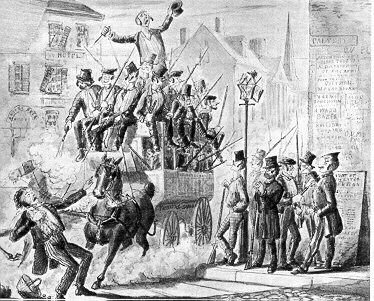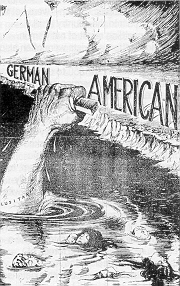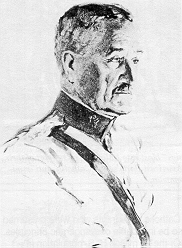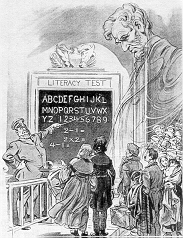



The American founding fathers wanted to establish a national state
which, like Great Britain, would be held together by a national language
and characterized by a national culture. Of course, they kept the country
open to immigrants, but they did not
view ethnic pluralism as a goal worthy of support. Open borders for them
was not analogous to splintering the population into a mosaic of ethnic
groups.
 Mass immigration from Ireland and the German-speaking countries,
beginning in the 1840s and continuing in the following decades, unleashed
a fear that the traditional character of the Euro-American society, its
Anglo-conformity and its Protestantism would
be endangered by the uncontrolled mass influx of poor, uneducated, and
for the most part Catholic immigrants who were presumed to be incapable
of democratic principles. Of the 23 million U. S. population in 1850,
almost 10% had been born abroad. This
low average figure, however, in no way expresses the threat perceived
from the dense centers of foreigners in the immigrant districts of some
large cities.
Mass immigration from Ireland and the German-speaking countries,
beginning in the 1840s and continuing in the following decades, unleashed
a fear that the traditional character of the Euro-American society, its
Anglo-conformity and its Protestantism would
be endangered by the uncontrolled mass influx of poor, uneducated, and
for the most part Catholic immigrants who were presumed to be incapable
of democratic principles. Of the 23 million U. S. population in 1850,
almost 10% had been born abroad. This
low average figure, however, in no way expresses the threat perceived
from the dense centers of foreigners in the immigrant districts of some
large cities.
 The 4.9 million immigrants who arrived from Europe between 1830 and 1860,
among them 1.36 million German-speakers, met head-on with a well-defined
"Americanism." The conflict was accentuated when several Midwest states
started to grant voting
privileges well before the five year waiting period for citizenship had
transpired. In Minnesota, a male adult got the right to vote practically
upon arrival.
Only four months had to elapse after he declared his intention to become
an American citizen. Using all available xenophobic
arguments, the immigrant-bashing nativist American Party, popularly
called the Know-Nothings, tried to extend the waiting period for
naturalization and for voting to 21 years instead of the five required by
law. In addition, immigrants were
to be permanently excluded from holding
public office; and the poor, those with criminal records, and the loyal
subjects of a "foreign power" -- above all members of the Roman Catholic
Church -- were not to be admitted into the country at all.
The 4.9 million immigrants who arrived from Europe between 1830 and 1860,
among them 1.36 million German-speakers, met head-on with a well-defined
"Americanism." The conflict was accentuated when several Midwest states
started to grant voting
privileges well before the five year waiting period for citizenship had
transpired. In Minnesota, a male adult got the right to vote practically
upon arrival.
Only four months had to elapse after he declared his intention to become
an American citizen. Using all available xenophobic
arguments, the immigrant-bashing nativist American Party, popularly
called the Know-Nothings, tried to extend the waiting period for
naturalization and for voting to 21 years instead of the five required by
law. In addition, immigrants were
to be permanently excluded from holding
public office; and the poor, those with criminal records, and the loyal
subjects of a "foreign power" -- above all members of the Roman Catholic
Church -- were not to be admitted into the country at all.
The unsettling result of nativism in Massachusetts -- nativists were
often also pro-temperance and pro-slavery -- motivated Carl Schurz in
1859 to deliver his oft-quoted patriotic sermon on "True Americanism." At
the time, the Massachusetts legislature
was proposing an amendment that would have barred immigrants from voting
for two years after naturalization. Schurz attacked this distrust as
irreconcilable with basic American
 values: "True Americanism, tolerance and equal rights will peacefully
overcome all that is not reconcilable with the irresistible strength of
our institutions." Like dozens of German-American publicists of his
generation and his political persuasion, Schurz tried to couple a
realistic recognition of the forces of assimilation, especially the
Anglo-American political culture, with a defense of the intrinsic values
of his own ethnic group. Reacting to the nativists,
the Forty-eighters made a substantial contribution to the "invention" of
a pluralistic model for a more gentle integration of the immigrants.
values: "True Americanism, tolerance and equal rights will peacefully
overcome all that is not reconcilable with the irresistible strength of
our institutions." Like dozens of German-American publicists of his
generation and his political persuasion, Schurz tried to couple a
realistic recognition of the forces of assimilation, especially the
Anglo-American political culture, with a defense of the intrinsic values
of his own ethnic group. Reacting to the nativists,
the Forty-eighters made a substantial contribution to the "invention" of
a pluralistic model for a more gentle integration of the immigrants.
Only in the face of the nation's divisive North-South conflict over
the expansion of slavery west of the Mississippi after 1856, did the
nativist American Party lose political influence without having achieved
its objective. However, if
anti-immigration agitation at this time had
not been overshadowed by the growing North-South controversy, then the
first federal laws curtailing immigration from Europe would probably have
been promulgated long before the literacy tests of 1917 acted as a retardant.
 Following
the War of Secession, and especially after the 1877 reintegration of the
South, American nationalism grew stronger than
ever before. In the following decades the United States identified with
Anglo-Saxon racist and superiority attitudes, with a strategy of naval
supremacy in the Pacific, and with Protestant missionary zeal in order to
justify its participation in the great
power rivalry for colonial possessions. Before America's entry into the
First World War, therefore, the public activities of pro-Kaiser
German-Americans and of other large polyglot immigrant groups in many big
cities reminded President Wilson,
Theodore Roosevelt and other vocal American "preparedness" supporters of
certain signs of malfunction in the "melting pot." Meanwhile, the orgies
of European nationalism also aroused America's nationalism with the
result that in 1916 a massive Anglo-Americanization
campaign was launched. The resulting "loyalty" hysteria that accompanied
the United States entry into the War led to an accelerated end of
organized German-American culture.
Following
the War of Secession, and especially after the 1877 reintegration of the
South, American nationalism grew stronger than
ever before. In the following decades the United States identified with
Anglo-Saxon racist and superiority attitudes, with a strategy of naval
supremacy in the Pacific, and with Protestant missionary zeal in order to
justify its participation in the great
power rivalry for colonial possessions. Before America's entry into the
First World War, therefore, the public activities of pro-Kaiser
German-Americans and of other large polyglot immigrant groups in many big
cities reminded President Wilson,
Theodore Roosevelt and other vocal American "preparedness" supporters of
certain signs of malfunction in the "melting pot." Meanwhile, the orgies
of European nationalism also aroused America's nationalism with the
result that in 1916 a massive Anglo-Americanization
campaign was launched. The resulting "loyalty" hysteria that accompanied
the United States entry into the War led to an accelerated end of
organized German-American culture.



 Mass immigration from Ireland and the German-speaking countries,
beginning in the 1840s and continuing in the following decades, unleashed
a fear that the traditional character of the Euro-American society, its
Anglo-conformity and its Protestantism would
be endangered by the uncontrolled mass influx of poor, uneducated, and
for the most part Catholic immigrants who were presumed to be incapable
of democratic principles. Of the 23 million U. S. population in 1850,
almost 10% had been born abroad. This
low average figure, however, in no way expresses the threat perceived
from the dense centers of foreigners in the immigrant districts of some
large cities.
Mass immigration from Ireland and the German-speaking countries,
beginning in the 1840s and continuing in the following decades, unleashed
a fear that the traditional character of the Euro-American society, its
Anglo-conformity and its Protestantism would
be endangered by the uncontrolled mass influx of poor, uneducated, and
for the most part Catholic immigrants who were presumed to be incapable
of democratic principles. Of the 23 million U. S. population in 1850,
almost 10% had been born abroad. This
low average figure, however, in no way expresses the threat perceived
from the dense centers of foreigners in the immigrant districts of some
large cities.





 values: "True Americanism, tolerance and equal rights will peacefully
overcome all that is not reconcilable with the irresistible strength of
our institutions." Like dozens of German-American publicists of his
generation and his political persuasion, Schurz tried to couple a
realistic recognition of the forces of assimilation, especially the
Anglo-American political culture, with a defense of the intrinsic values
of his own ethnic group. Reacting to the nativists,
the Forty-eighters made a substantial contribution to the "invention" of
a pluralistic model for a more gentle integration of the immigrants.
values: "True Americanism, tolerance and equal rights will peacefully
overcome all that is not reconcilable with the irresistible strength of
our institutions." Like dozens of German-American publicists of his
generation and his political persuasion, Schurz tried to couple a
realistic recognition of the forces of assimilation, especially the
Anglo-American political culture, with a defense of the intrinsic values
of his own ethnic group. Reacting to the nativists,
the Forty-eighters made a substantial contribution to the "invention" of
a pluralistic model for a more gentle integration of the immigrants.
